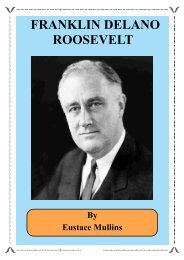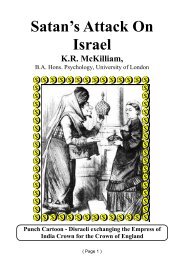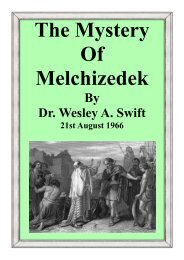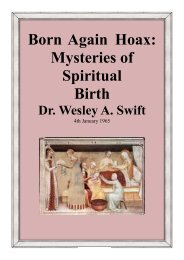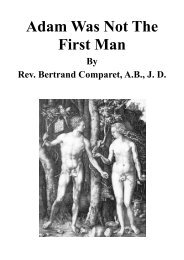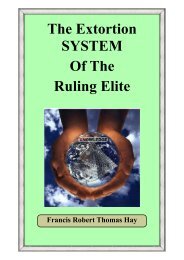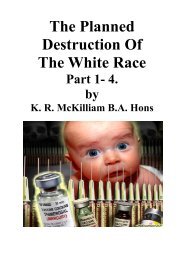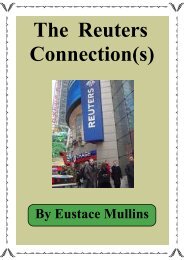Curse of Cannan - The New Ensign
Curse of Cannan - The New Ensign
Curse of Cannan - The New Ensign
You also want an ePaper? Increase the reach of your titles
YUMPU automatically turns print PDFs into web optimized ePapers that Google loves.
about the French Revolution and would bring about and would be the cause <strong>of</strong> all future<br />
revolutions." Monsignor Dillon, writing in 1885, <strong>of</strong>fered a further comment: "However<br />
subversive the doctrines <strong>of</strong> the Grand Order may have been-and undoubtedly were-it was not<br />
Freemasonry itself but Illuminism which organized the movement <strong>of</strong> which the French<br />
Revolution was but the first manifestation."<br />
<strong>The</strong> great French historian, Hippolyte Taine, wrote: "Liberty, equality, fraternity! Whatever the<br />
great words with which the Revolution was ornamented, it was essentially a transference <strong>of</strong><br />
property."<br />
<strong>The</strong> successful conclusion <strong>of</strong> the Napoleonic Wars found the Rothschilds in unchallenged control<br />
<strong>of</strong> that property. <strong>The</strong>y held the Congress <strong>of</strong> Vienna to celebrate their great victories. Von Gentz,<br />
secretary to Prince Metternich, pointed out that there never really was a Congress <strong>of</strong> Vienna; the<br />
Rothschilds merely dictated the signing <strong>of</strong> the Final Act, in June <strong>of</strong> 1815, to the four great powers.<br />
Von Gentz comments, "<strong>The</strong> real purpose <strong>of</strong> the Congress was to divide among the conquerors<br />
the spoils taken from the vanquished."<br />
<strong>The</strong> Congress <strong>of</strong> Vienna was formally headed by Lord Castlereagh, Foreign Minister <strong>of</strong> Great<br />
Britain, and his half brother, Lord Charles Stewart, who was serving as Ambassador<br />
Plenipotentiary to Vienna. Lord Aberdeen, Lord Cathcart, and Lady Burghe, a niece <strong>of</strong> the Duke<br />
<strong>of</strong> Wellington, also represented Great Britain. Princess Thurn und Taxis arranged nightly<br />
meetings in her drawing room between Talleyrand and the Czar <strong>of</strong> Russia. During these meetings,<br />
Talleyrand routinely betrayed the French people. Nearly all the royalty <strong>of</strong> Europe was present<br />
in Vienna for the Congress. <strong>The</strong>y gathered at the Opera House for a special concert by Beethoven,<br />
which he conducted.<br />
Because England was the victorious power, the world supremacy <strong>of</strong> British naval power was<br />
accepted without question by the members <strong>of</strong> the Congress. An important piece <strong>of</strong> business was<br />
the passage <strong>of</strong> Acts on March 20 and March 29, 1815, which permanently guaranteed Swiss<br />
neutrality. <strong>The</strong>se acts not only ensured that Switzerland would continue to be the nation where<br />
the revolutions <strong>of</strong> the world could be plotted, but also that the ill- gotten gains <strong>of</strong> those revolutions<br />
would be guaranteed safe deposit and insurance against being repossessed by the victims <strong>of</strong><br />
robberies.<br />
Lord Castlereagh later addressed the House <strong>of</strong> Commons in this report on the Congress: "<strong>The</strong><br />
Congress <strong>of</strong> Vienna was Hot assembled for the discussion <strong>of</strong> moral principles, but for great<br />
practical purposes, to establish effectual provisions for the general security." One <strong>of</strong> these<br />
provisions was Nathan Mayer Rothschild's setting up a Special German Committee It the<br />
Congress to work out a grant <strong>of</strong> rights to German Jews. This provision was inserted into the final<br />
Act, which was then advertised as establishing "equilibrium in Europe," the famed doctrine later<br />
known as "the balance <strong>of</strong> power." In fact, British Intelligence, led by Lord Shelburne, had<br />
operated the entire French Revolution from London as a Masonic plot to rid England <strong>of</strong> its oldest<br />
and most historic rival. After 1815, I France never again mounted any threat to the British<br />
hegemony. It was not a balance <strong>of</strong> power at all; it was the triumph <strong>of</strong> the Hegelian system.<br />
<strong>The</strong> Bourbons had now become a weak and ineffectual ruling family: Lord Castlereagh formally<br />
restored them to the throne in the Treaty <strong>of</strong> Paris, only because they would be an important<br />
contributing factor to France's future weakness.<br />
Castlereagh, Marquis <strong>of</strong> Londonderry, was now considered the most powerful single politician<br />
in the world. He was the godson <strong>of</strong> Lord Camden, who, with Lord Shelburne, had lent large<br />
sums to Britain's Prime Minister, William Pitt; thereafter they were able to control him for their<br />
own devious purposes. Lord Shelburne, William Petty, was denounced by Edmund Burke as "a<br />
Cataline or Borgia in morals," which was undoubtedly true. Henry Kissinger openly modelled<br />
his own diplomatic techniques on those <strong>of</strong> Lord Castlereagh. In his book "A World Restored,"<br />
( Page 63)



